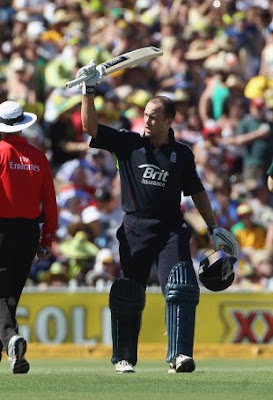
New Zealand 356 (Vettori 110, Gul 4-87) and 293 (Guptill 73, Gul 4-61) drew Pakistan 376 (Misbah 99, Martin 4-91) and 226 for 5 (Younis 81, Misbah 70*)
Pakistan weathered a hostile opening spell that reduced them to 42 for 3 in the first hour, worked their way to safety in the second session, and made a half-hearted attempt to win the Test before settling for a draw that gave them the series 1-0. It was their first victory outside the subcontinent since the triumph in New Zealand in 2003-04, and their first anywhere since 2006-07. It was another impressive result for a team that has managed to hold its own on the field - with Test wins against England and Australia, and a drawn series against South Africa - despite facing a mountain of problems off it.
Pakistan's resistance was led by Misbah-ul-Haq and Younis Khan for the second time in the match, after Chris Martin and Tim Southee had hustled out the top three. The action unraveled at a furious pace in the morning before settling into classic Test-match grind during the afternoon. New Zealand's woes were compounded by Daniel Vettori's disappointing show, on a pitch where even Mohammad Hafeez's part-time fare had turned viciously on day four. As things transpired, Pakistan adopted the path of complete caution, which ultimately left them short of time to push for a win against an attack that withered, despite a late surge from Vettori in his last Test as captain.
New Zealand's bowlers began in stark contrast to the manner in which they finished. Martin bounded in from wide of the crease and bent his inswingers into the right-handers, while Southee got his legcutters to straighten lethally. Their menacing rhythm crippled Pakistan's chase before they could find their bearings.
Taufeeq Umar succumbed first ball, as Southee got one to land on off stump, straighten and burst through the forward press to hit the back pad. Martin got the inswingers going, and mixed them cleverly to plant seeds of doubt in the batsmen's minds. Hafeez was conscious to push forward and negate the inward movement, but ended up groping for the ones that held their line. He played one off a thick outside edge through the covers, and survived a possible edge off Martin that umpire Rod Tucker did not spot.
Tempers frayed, and words were exchanged between Southee and Hafeez following a couple of pacy short balls that were dispatched to the boundary, but Martin plugged away without a fuss. Azhar Ali walked into a flick to be trapped by another inswinger, and Younis barely survived a couple of deliveries that whistled past his outside edge. Hafeez eventually ran out of luck, as Martin enticed him to edge one behind, and the dejected batsmen slapped his helmet with the bat in admonishment as he walked off.
Younis overcame the uncertain start to settle down with an assurance that justified his enviable fourth-innings record. With the ball losing its shine, Martin's inswing disappeared, allowing Younis to pick him for boundaries behind square, straight and through gully. Vettori held the key, but his ineffectiveness was epitomised by the fact that his only weapon was the quicker one that skidded through. Younis handled him with clear and decisive footwork, while Misbah resorted to playing inside the line with soft hands.
With the main bowlers failing in their opening spells after lunch, Vettori resorted to James Franklin who nearly produced the breakthrough. With the score on 108, Misbah carved him uppishly past the covers, his only major error on a day of immense resolve. On either side of that blemish, Misbah was so efficient that he was almost completely unnoticed. He only opened up with tea in sight, pulling and steering Southee off the back foot to take his side past 150.
Misbah's approach meant the spotlight was completely on Younis, and his trademark flourish shone through despite the dullness of the proceedings. His hallmark in the first innings was his shot selection, but today it was his judgment. Brent Arnel tested him with a slew of full deliveries, but Younis played him out before capitalising on a half-volley. When the spinners - Vettori and Martin Guptill - came back in search of turn, Younis pounced, stealing five boundaries to leave New Zealand worried. His dismissal at the stroke of tea, edging a harmless delivery behind, was completely out of character and against the run of play, and it decisively altered Pakistan's approach after the break.
The final session was an anti-climactic period of attrition, with both sides more anxious to avoid defeat than to push for a victory. With Younis gone, Misbah fastened the shutters he had already downed. Defending 114 in a minimum of 33.2 overs, New Zealand were not keen on a full frontal attack, either. Asad Shafiq was on a pair for 22 balls before opening his account with a six and a four through Vettori's open straight fields. He later unfurled a couple of pleasing hook shots when a tiring Southee pitched short. Misbah was not tempted so easily, scoring almost exclusively when he was fed on his pads, to move to his sixth successive half-century, three of them unbeaten.
Realising that Pakistan had shut shop, Vettori brought some fielders close in and removed Shafiq in the 84th over. It was the first time in the day that he had managed to look threatening, and it had come too late for his side. His loud appeals as the game sputtered to a close were in contrast to Misbah's unwavering calmness. The battle may have ended in stalemate, but Misbah had won the war for his side.









